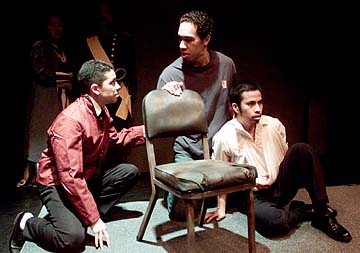


|
Few aspects of Hawaiian history are more puzzling than the failure of the Hawaiian people to stand up against foreign subversion in the late-19th century with the same kind of martial prowess seen during Kamehameha's wars of unification and Kekuaokalani's doomed anti-foreigner campaign following Kamehameha's death. Marching to the beat
of sovereignty"To the Last Hawaiian Soldier" fights
the good fight but falls short in some areas
By John Berger
jberger@starbulletin.comThat Kumu Kahua is presenting Sean O'Malley's new play, "To the Last Hawaiian Soldier," in January -- the month in which the Hawaiian government was overthrown in 1893 -- makes it timely, but the production is intended to be more than a history lesson.
Director Harry Wong III asks in the playbill notes, "What drives someone to use 'terror' to attain political ends?"
O'Malley asks his audience to consider what might happen if a single modern Hawaiian nationalist were to decide that violence may have more impact than years of talk that has won little reparations for Hawaiians.
O'Malley tells two parallel stories. The first is based on Robert Wilcox's unsuccessful attempt to defend Iolani Palace and force the repeal of the Bayonet Constitution in 1889. Although O'Malley's account is based on actual events, it "is in no way intended to be a biographically accurate depiction" of the personal relationships between Wilcox, Kalakaua and Liliuokalani, but rather the "imaginings" of two contemporary Hawaiian nationalists.
One of them is Pualani Kaneshiro, who has returned to Hawaii with a Yale-graduate Caucasian college professor boyfriend and a newly published book on Wilcox's defense of the monarchy. Her perspective is reflected by the title, "An Act of Courage." The other is Junior Koalua, her ex from high school, a rough-edged local boy who hasn't done much with his life since they broke up. Several bits and pieces of their former relationship remain unresolved and smoldering beneath the surface of a tentative friendship.
Junior has helped clean up after American bombings on Kahoolawe but is not otherwise an activist or a militant Hawaiian patriot -- at least not until he reads Pua's book.
Junior plants a bomb in a hotel. The blast kills a Hawaiian hotel worker, and a tourist and her child. Pua finds him hiding in the abandoned bunker that was once their love nest. The police have followed her there.
Moses Goods III, one of Honolulu's most accomplished young actors, adds another brilliant performance to his already impressive resume with his work in the dual role of Wilcox/Junior. Wilcox was an educated and well-traveled man, and Goods is as believable portraying these qualities as he is portraying Junior, with his pidgin thick with obscenities, morphing effortlessly between the two dissimilar characters.
Margaret Jones, as Pua, plays off Junior beautifully in several intense scenes. She and Goods create a fine representation of the prickly and uncomfortable chemistry that can percolate between former lovers.
Zhan H. Hunt (Liliuokalani), Wil T.K. Kahale (Kalakaua), John Wythe White (Jerry Reinhardt/Col. Ashford) and Norman M. Munoz (Hay Johnson/J.M. Kaneakua) add strong performances in the major supporting roles. Chad Jacinto-Seronio portrays two secondary characters.
Hunt is charming as Liliuokalani, and Kahale gives a poignant portrayal of a besieged monarch torn between fear and defiance of his powerful enemies. White and Goods bring a welcome bit of subdued levity in the scenes where Junior encounters his ex's new boyfriend and the two men warily appraise each other.
O'Malley has a fine touch when it comes to such details, and "To the Last Hawaiian Soldier" is a promising contribution to local theater. What it lacks is the additional character development necessary to make Junior's transformation more than a plot device. There's a big difference between helping to restore Kahoolawe and planting a bomb. Was Pua's book that compelling? Did he do it to impress her and possibly win her back? To show her that he was more of a "real man" than her upscale boyfriend? Because he could "hear" Wilcox talking to him? Offering any reason for Junior's metamorphosis would eliminate a hole in the story.
Junior tells Pua plenty while they're holed up in the bunker but doesn't say a word about what his "act of courage" was intended to accomplish.
Robert Wilcox was a Hawaiian patriot who knew what he fought for and remained an articulate advocate of Hawaiian self-determination even after annexation. The terrorist groups of the 20th century likewise operated with clear political goals and objectives.
"To the Last Hawaiian Soldier" will fulfill its promise when O'Malley and Wong tie up the loose ends.
"To the Last Hawaiian Soldier"
Presented by Kumu KahuaWhere: Kumu Kahua Theatre, 46 Merchant St.
When: 8 p.m. Thursdays to Saturdays, and 2 p.m. Sundays, through Feb. 10
Tickets: $15 ($10 for students); $10 for unemployed on Thursdays
Call: 536-4222
Click for online
calendars and events.